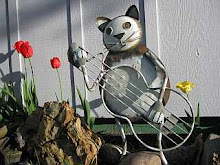The official low temperature last night was minus 21 F - a new low record. My thermometer had a low of minus 24 F. It was minus 22 F when I went outside at 8:30 am to feed the cattle. All the cattle were frosty white. So far the cattle seem to be doing well.
Now that the temperatures have gotten frigid I plugged in a light bulb for heat in my little shed for the well. In case the light bulb burns out I also plugged in a small space heater as a backup. I like using the light bulb more than the space heater as the light bulb puts out continuous low level heat unlike the heater which goes off and on and heats some parts of the shed more than others.
It is a challenge to keep two livestock water troughs ice free. I have a heating unit that sits on the bottom of the trough. In really cold temperatures, and with a full water trough, ice can form on top of the water.
I have a floating water heater that is nice as it warms the top of the water and keeps the ice away.
But last year the floating unit began to trip my GFCI circuit breaker so I switched to using the bottom sitting heater. When it wasn't as frigid I was able to alternate water troughs with the heating unit to keep the trough from forming thick ice. A few days ago I found the floating unit no longer tripped the circuit breaker and began using it. The other night I found my breaker tripped and I had to stop using the floating unit as a tripped breaker also shuts power off to the other heater.
I suspected the problem was because some water got into the floating unit, though I don't know why that should be a problem. The bottom sitting unit looks to be the same design with the difference is that the metal is all exposed. I hung the floating unit over the wood stove and dried it out. I glued all the seams in hopes of completely sealing the unit so it will work. So far tonight the floating unit is heating and not tripping the GFCI circuit breaker.
Even after I refill the water troughs old ice usually remains at the place where it froze even though ice does float. The water from the well is so cold the ice doesn't have much of a chance to melt before the water begins to freeze.
Thursday, February 06, 2014
Subscribe to:
Post Comments (Atom)







No comments:
Post a Comment